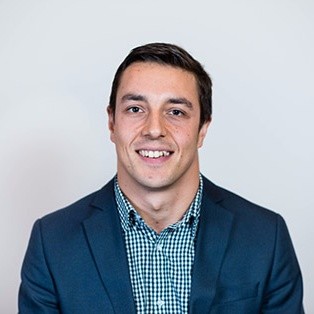Almost three years ago, my cousin died.
My name is Tom. I am a learning and development professional working in a law firm in London.
When I was born, on my dad’s side I was the youngest of six cousins. My dad had a brother, who had two children, a boy and a girl, and a sister who had three girls. As the oldest cousin, Simon slowly became more and more outnumbered, firstly by his own sister, and then by his three cousins.
When I came along, I was told he was buzzing. Finally another boy in the family. My parents made him my godfather, and I have some great memories of him as a young teenager and me at 6 or 7 years old.
In April 1998, Simon died. He suffered from blackouts and had fallen in a car park and hit his head. He was in hospital for a while. I never visited him. Eventually they turned off the life support. He was gone.
At the time, I really don’t remember how I felt. I was only eight. I probably didn’t really understand it. As time went on, his death became harder to understand and cope with. By now, I had a younger sister too, and so now it was me outnumbered, the only boy amongst a host of female cousins.
Simon’s younger sister, Bok, was now in her mid-20s, and she took over the role of godfather. In many ways, she became more of a godfather than he ever had the chance to be. I went to stay with her, she would talk to me about James Bond, Cars, things that seemed “adult” to a young child. She made me feel special. When she got married, I was a Page Boy. When she got divorced, I was one of the first people she told. She always seemed so “cool” and “adult” and was so much more than just a cousin.
In 2016, Bok got breast cancer. She tackled it with her usual overwhelming positivity, started blogging her journey, and in 2018 was given the all clear.
However, in 2018, it returned with a vengeance. The blog started again https://buyabiggerbucket.com/, she continued to battle, but in November 2020 her battle ended.
In the meantime, my progress at work had stalled. I felt I was worthy of the next promotion, but it wasn’t coming. Feedback was around an inability to ask questions and rely on others. Instead, I was trying to do things myself, not working collaboratively, and ultimately failing.
I had a bit of a meltdown to a colleague, and I decided to get some help. Through work, I signed up to therapy (not my first experience), and began to explore the loss of my cousin Simon. At this stage, Bok was still alive and fighting her cancer.
As is so often the way, my issues lead back to that loss. Losing my cousin so young had taught me not to rely on people. If I didn’t “need” someone else, then when they weren’t around any more, I would know I could cope without them. My whole concept of support, of collaboration, of relying on others was messed up. Over the next couple of years, I worked on this, every day, relying on people, becoming vulnerable to them letting me down or leaving. It wasn’t easy, but my work improved.
I interviewed for the role that I’d felt I deserved for a year. Instead of feeling I was entitled to it, I now felt I was earning it. One day after Bok died, I was offered the job. Unsurprisingly, my reaction and emotions were mixed. I jumped straight back into therapy to understand this new loss and prepared for my new role.
Nearly three years on, my attitude and relationship with work is so much stronger. I understand the power of relying on support, of seeking advice, of using others. I also understand myself so much more than I ever did. I still have to work on dealing with these losses most days, but I couldn’t have asked for a more supportive work environment. The people, the wellbeing support and set up, my manager, everything is set up to support us as staff. The whole process taught me the importance of trying to talk, trying to understand what was going on, but also taking on board feedback and taking responsibility to improve myself.
I will be forever grateful to my colleague for her reaction to my initial meltdown. She supported me and encouraged me to get help. It’s not always easy to talk, but if anyone reading this is struggling, I would encourage you to look at the support available. If you can’t talk, write it down, draw it, try and understand why you’re struggling. You don’t have to struggle alone, there are always options, it is just about trying to work out what the right options are. Some workplaces have Employee Assistance Programmes (EAPs). You might also have support through medical insurance. If not, just speaking to a manager or colleague can help. There are always options.
I still deal with the loss of both my cousins on a daily basis, but my response to my grief is much healthier than it was. I still have bad days, plenty of them, but I recognise them now, deal with them, and don’t let them impact my work. I acknowledge that the majority of this success is down to my own ability to open up and work on things, but the supportive work environment has played a huge part too.


